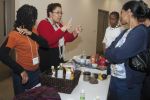In the Black community where unemployment, violence and poor education are the key areas of focus, many African-Americans feel they don’t have time to take on other issues like “environmental justice.” However, at an event hosted by New Voices Pittsburgh, as part of their HerStory Month celebration, African-American women were shown how “environmental justice” has a great impact on their lives and their wallets.
 |
| COST OF BEAUTY—LaKeisha Wolf and Sheba Gittens, a natural hair care stylist, talk hair dos and don’ts.
|
“I hope people were able to see Pittsburgh is buzzing with all different kinds of women who want to see a positive change. I also want everyone who attended to realize we have a connection with the environment,” said Bekezela Mguni, program director of New Voices Pittsburgh: Women of Color for Reproductive Justice. “I started by looking at the women in the community and their connection to health, environmental health, and reproductive justice.”
The “Kinks, Locks & Twists: Environmental and Reproductive Justice Conference 2012,” addressed issues ranging from healing with herbs to massage therapy. But for many at the event at the Kingsley Association on March 3, the most eye opening sessions were the ones showing them how much money they waste by not being environmentally conscious.
“A lot of states and Pennsylvania is one of them, have different grants and subsidies for these kinds of things,” said Jacqui Patterson, director of the NAACP Environmental and Climate Justice Program.
In her keynote address, Patterson talked about large-scale energy savers like solar panels that are positive for the environment and can also save money. She also talked about dangerous sources of energy that are not only harmful to the environment, but to a person’s health, such as a coal plant in Chicago that scientists deemed was responsible for 100 cases of asthma per year.
Showing smaller scale solutions to going green was the session “Sistah’s Savin’ Energy, Savin’ the Earth, Savin’ Money,” which tackled the task of reducing utility costs. Solutions included reducing shower times, installing energy saving light bulbs, and having your home weatherized, which can be done by Action Housing at no cost for low-income families.
“Heating your home accounts for 35 to 47 percent of an average home’s energy bill. According to EnergyStar, programmable thermostats, when used properly, can save up to $150 a year on your heating bill,” said Nikki Williams, an energy outreach educator with Action Housing. “It’s suggested that you set your thermostat to 68 degrees in the winter and 78 degrees in the summer to save energy.”
In the session “The Cost of Beauty,” participants learned about the harsh effects chemicals found in personal care products can have on the environment and their own health. More startling to some, was the high price African-American women pay for their “beauty,” particularly in the hair care industry with products like hair extensions.
“Young women are constantly being told there’s something wrong with them. Whether they’re light or dark. African-Americans spend over $6 billion per year on personal care products and that’s five times more than the average person and that average person is usually a White person,” said LaKeisha Wolf, founding member of the Ujamaa Collective. “There are all these companies that are making money off our issues. We as a community have no equity, no assets in that industry. These are stores where we have no control.”